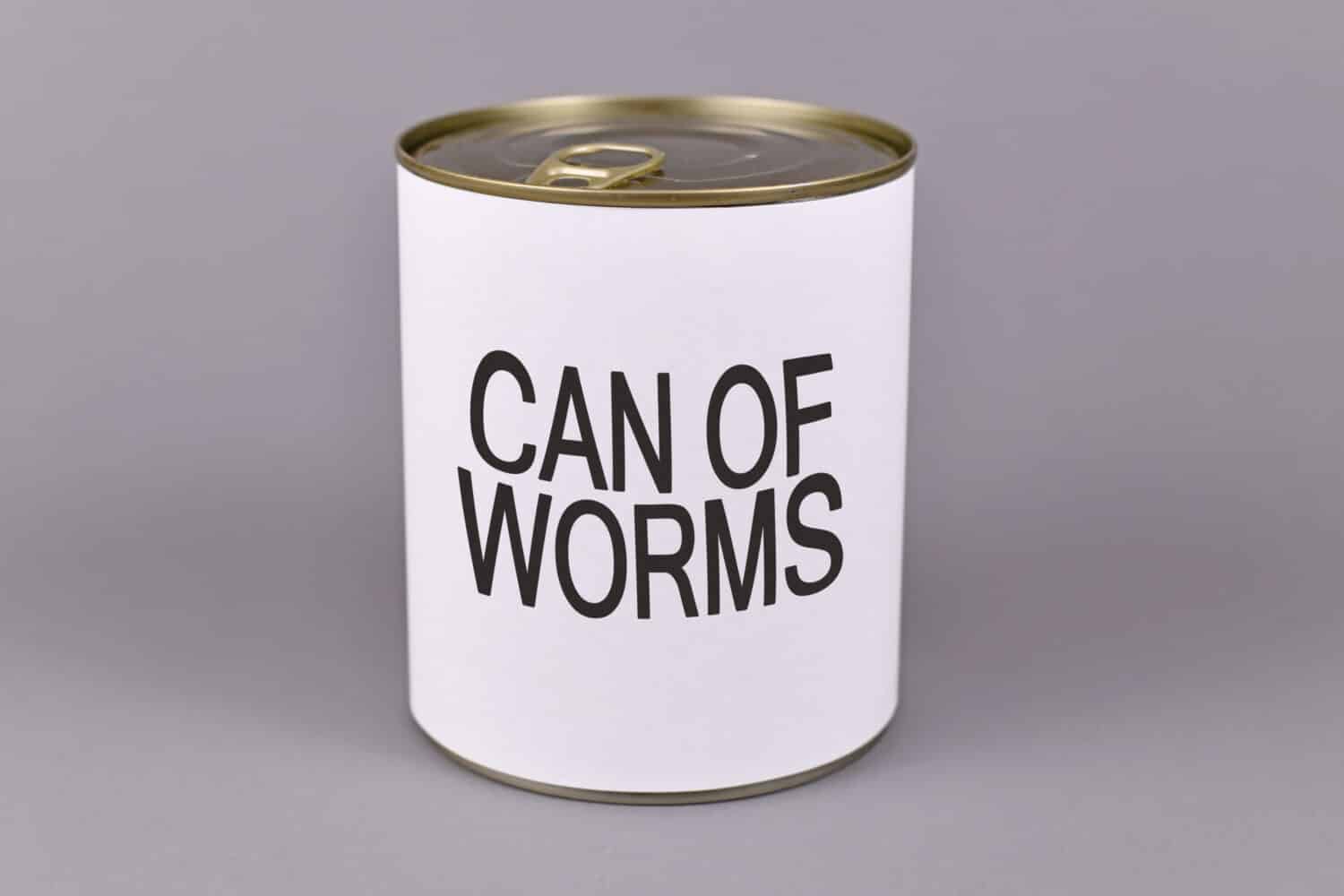The English language, filled with fascinating idioms and expressions, adds color and depth to our everyday conversations. One such phrase that has piqued curiosity and sparked imagery in the minds of many is ‘can of worms.’ Let’s explore ‘can of worms’ meaning and origin.
This idiom carries a figurative meaning that suggests the opening of a complicated situation. Delving into this phrase’s possible origins and meanings reveals a captivating history. However, a single, universally accepted origin is elusive.

The phrase ‘can of worms’ may originate from fishermen.
©Firn/Shutterstock.com
Origin of the Phrase ‘Can of Worms’
The exact origin of the phrase ‘can of worms’ is not entirely known. But there are a few theories, some stronger than others.
Fishermen
However, a consensus traces it back to the 1950s in the United States, where it originated from literal cans of worms used by fishermen. During that time, anglers would purchase sealed metal cans filled with earthworms as bait instead of plastic containers or Styrofoam cups commonly used today.
When fishermen arrived at their chosen fishing spot, they would place the metal can on the ground and proceed to open it. Inside the can resided a squirming mass of live worms, ready to be used as bait. However, if the top of the can were left open for too long or accidentally tipped over, the once neatly contained worms would escape, creating chaos. Suddenly, the angler’s primary concern shifted from catching fish to recapturing the wriggling worms.
The earliest documented example of the phrase can be found in the 1951 edition of the Edwardsville Intelligencer in Illinois, where they used it figuratively. This evidence suggests that the idiom had already gained popularity and was used metaphorically to describe complex and problematic situations.
The Phrase ‘Pandora’s Box’
Interestingly, linguists propose that the expression ‘can of worms’ is a more modern, Americanized version of the phrase ‘opening Pandora’s Box.’ Originally, in Greek mythology, Pandora was given a jar (not a box), which she was told not to open. However, due to mistranslations over time, the phrase became known as “Pandora’s Box.” The concept behind the mythological tale is similar to that of ‘can of worms,’ emphasizing the idea that opening something with unknown contents can lead to a multitude of unforeseen and difficult problems.
Medical Leeching
Another strange theory suggests that the phrase may have its roots in past medical practices. Before the advent of modern medicine, they used leeches to treat various ailments. They stored leeches n jars or cans, and the container would release these squirming creatures when opened. The task of handling and controlling these wriggling leeches mirrored the challenge of dealing with a complex issue, potentially leading to the metaphorical use of ‘can of worms.’
While the precise origin of the ‘can of worms’ might be debatable, the concept of literal cans of worms used by fishermen in the 1950s and the metaphorical association with complex situations is a well-accepted explanation. This idiom quickly found its way into common usage, capturing the imagination of the general population and becoming a popular expression to describe challenging and intricate scenarios.

Medical leeches may be a contributing origin to the phrase ‘can of worms.’
©Doro Guzenda/Shutterstock.com
The Meaning Behind the Phrase ‘Can of Worms’
Across the general population, the phrase ‘can of worms’ is widely understood to symbolize a complex or intricate situation that, when opened, becomes difficult to manage or control. Its figurative usage conveys the idea that delving into a particular matter can lead to unforeseen complications and additional problems. The phrase often implies that opening the proverbial ‘can of worms’ might be ill-advised or result in unwanted consequences.
You can apply the concept behind the phrase in various contexts. For instance, opening a can of worms in interpersonal relationships might refer to discussing sensitive or contentious topics that could lead to conflicts or emotional upheaval. In politics or legal matters, it could allude to the potential consequences of unveiling hidden information or initiating investigations that expose corruption or wrongdoing.
While the precise origin of the phrase might be subject to speculation, its usage and meaning have become well-established in contemporary language. The metaphorical power of ‘can of worms’ continues to resonate with individuals from diverse backgrounds, effortlessly conveying the complexities and challenges of certain situations.

The figurative use of the phrase ‘can of worms’ conveys the idea that delving into a particular matter may lead to unforeseen complications or additional problems.
©Song_about_summer/Shutterstock.com
Uses of the Phrase ‘Can of Worms’
This idiom is commonly used in everyday conversations, allowing individuals to describe the unraveling of complications succinctly. Moreover, the practical uses of the phrase extend beyond its figurative application, finding relevance in various fields and scenarios. Let us explore detailed examples of the everyday use and practical applications of the phrase ‘can of worms.’
Everyday Use of the Phrase
The phrase ‘can of worms’ finds frequent use in everyday language, providing a concise and descriptive depiction of complex situations. It is often employed to caution against the potential consequences or difficulties that may arise when addressing certain issues. Here are a few examples of its everyday usage.
In Personal Relationships
Bringing up past infidelities in a relationship can open a can of worms, potentially leading to jealousy, distrust, and emotional turmoil between partners.
In Controversial Topics
Discussing politics at a family gathering can quickly turn into a can of worms, as differing opinions and heated arguments may arise, straining relationships or causing disagreements among family members.
In Organizational Matters
Proposing changes to an established workflow within a company can open a can of worms, requiring careful planning and consideration of potential challenges and resistance from employees. It may lead to adjustments in roles, responsibilities, and procedures.
In Legal Proceedings
Uncovering new evidence during a trial can open a can of worms, revealing complex connections, hidden motives, or previously unknown information that may complicate the legal process or change the course of the case.
Practical Uses of the Phrase
Beyond its metaphorical application, the phrase ‘can of worms’ has practical uses in various fields and scenarios. Its versatility allows it to serve as a warning or highlight certain actions’ potential consequences. Here are a few practical uses of the phrase:
In Risk Management
In the field of risk assessment and management, the phrase ‘can of worms’ is employed to describe potential risks that, once initiated, may lead to a cascade of unforeseen consequences. It serves as a reminder to thoroughly evaluate and consider the potential outcomes before proceeding. For example, introducing new technology without sufficient testing or safeguards can open a can of worms by exposing vulnerabilities and creating additional risks.
In Project Management
When planning complex projects, project managers may refer to certain aspects or tasks as ‘cans of worms’ to highlight the intricacies and challenges involved. This simple phrase emphasizes the need for thorough analysis, appropriate resource allocation, and contingency planning. For instance, integrating multiple legacy systems in an organization can be a can of worms due to compatibility issues, data migration challenges, and potential disruptions to existing operations.
In Crisis Management
During crises, such as natural disasters or emergencies, the phrase ‘can of worms’ can be used to describe the unfolding challenges and complexities that emerge. It emphasizes the need for preparedness and a comprehensive approach to simultaneously address the multiple issues that arise. For instance, managing a hurricane’s aftermath can be a can of worms, involving tasks like rescue operations, coordinating relief efforts, infrastructure repairs, and ensuring public safety.
In Policy Development
In policymaking, the phrase ‘can of worms’ can be employed to highlight the potential unintended consequences or complexities associated with implementing certain regulations or reforms. It encourages policymakers to consider the broader implications, engage in thorough analysis, and solicit stakeholder input before making decisions. For example, changing tax laws can open a can of worms, affecting businesses, individuals, and the economy in unexpected ways, necessitating careful deliberation and consideration of potential ramifications.

Project managers may refer to certain aspects or tasks when planning complex projects as ‘cans of worms.’ Highlight the challenges involved.
©fizkes/Shutterstock.com
Examples of the Phrase ‘Can of Worms’ in Conversation
Casual Conversation
Person A: “I heard Sarah and John broke up. I wonder what happened.”
Person B: “Well, relationships are like a can of worms. Once you start digging into their issues, it’s hard to predict what you’ll find.”
Workplace Discussion
Colleague A: “I think we should implement a new software system to streamline our processes.”
Colleague B: “That could open a can of worms. We’ll need to consider compatibility, user training, and potential disruptions to our current workflow.”
Family Gathering
Family Member A: “Let’s not talk about politics tonight. It always turns into a can of worms.”
Family Member B: “I agree. We want to enjoy the evening without heated arguments and strained relationships.”
Planning an Event
Organizer A: “We should invite both sides of the family to the wedding, even though they don’t get along.”
Organizer B: “Be careful. It could open a can of worms and create tension during the event. We need to think about seating arrangements and potential conflicts.”
Friend’s Dilemma
Friend A: “I want to confront my roommate about their messy habits, but I’m afraid it will cause problems.”
Friend B: “Addressing it can be a can of worms, but it’s important to communicate openly. Just be prepared for the conversation to bring up other issues as well.”
In these examples, the phrase ‘can of worms’ effectively conveys the potential complexities, uncertainties, and challenges associated with various situations. It serves as a warning or cautionary remark, allowing individuals to express their concerns and provide insights into the possible outcomes of engaging with a particular issue or topic.
This phrase is a versatile expression that finds utility in everyday conversations. It enables individuals to succinctly communicate a situation’s intricacies and potential difficulties, whether it’s in casual conversations, workplace discussions, family gatherings, event planning, or personal dilemmas.

The phrase ‘can of worms’ can help describe a complicated or challenging situation.
©alphaspirit.it/Shutterstock.com
The Phrase ‘Can of Worms’ in Cinema and Literature
The phrase ‘can of worms’ has become a part of everyday language. It has found its way into the realm of fiction, and it continues to captivate audiences with its evocative imagery. This versatile idiom is often utilized in literature and film to depict complex and unraveling situations. From books to movies, the phrase ‘can of worms’ has been incorporated into various narratives. It showcases its enduring relevance as a metaphor for intricate challenges and unexpected consequences. Let us explore fictional examples, cinematic uses, and works that center their stories around the phrase ‘can of worms.’
Works Involving the Phrase ‘Can of Worms’
The phrase ‘can of worms’ has made its mark in fictional works. Its use has allowed authors and filmmakers to convey complex situations and conflicts. Here are a few examples of its use.
In Literature
In George Orwell’s dystopian novel “1984,” the protagonist, Winston Smith, discovers a hidden room within the Ministry of Truth. This discovery unveils a ‘can of worms’ into a labyrinth of secrets. As well as forbidden knowledge that ultimately challenges his loyalty to the oppressive regime. The phrase serves as a metaphor for unraveling an intricate web of deceit.
The book “Gone Girl” by Gillian Flynn is a psychological thriller. It is also a movie. The plot centers around the marriage of Nick and Amy Dunne. Their marriage takes a dark turn when Amy disappears on their anniversary. As the investigation unfolds, layers of deception, secrets, and unexpected twists are revealed, metaphorically representing a ‘can of worms’. The story delves into the complexities of relationships and the consequences of hidden truths.
Another book that is also a movie is “The Girl with the Dragon Tattoo.” It is a best-selling novel written by Stieg Larsson. The book follows journalist Mikael Blomkvist and hacker Lisbeth Salander as they investigate a decades-old disappearance. The investigation uncovers a web of corruption, abuse, and dark family secrets—a figurative ‘can of worms’. The story explores the complexities of power dynamics and exposes the hidden darkness lurking beneath the surface.
In Cinema
In the various movies of “Jurassic Park,” the concept of resurrecting dinosaurs through cloning can be seen as opening a ‘can of worms’. The scientists’ initial excitement and curiosity quickly turn into a perilous situation as the resurrected creatures wreak havoc. This highlights the unintended consequences and complexities that arise from meddling with nature.
“Ocean’s Eleven” (2001) is a heist film. Danny Ocean (played by George Clooney) assembles a team of skilled criminals to carry out a complex casino robbery. When they encounter unexpected obstacles and complications during the operation, Danny describes the situation as “a real can of worms.” They use the phrase to illustrate the intricacies and challenges that arise as the heist unfolds.
There is “The Social Network” (2010), a biographical drama about the founding of Facebook. Mark Zuckerberg (played by Jesse Eisenberg) navigates the legal and personal ramifications of creating the social media platform. As lawsuits and conflicts arise, the phrase ‘can of worms’ is used metaphorically to emphasize the escalating complexities. In addition to unforeseen consequences that Zuckerberg encounters.
The phrase ‘can of worms’ has not only become an integral part of everyday language. It has also found a place in the realm of fiction. Authors and filmmakers use the phrase in both literature and film to vividly depict complex situations. It is used to unravel challenges and unforeseen consequences. Numerous narratives incorporate the concept of opening a can of worms to explore intricate themes and plotlines.

The phrase ‘can of worms’ is used metaphorically in many films.
©Serhii Bobyk/Shutterstock.com
Conclusion
The phrase ‘can of worms’ has emerged as a popular idiom in the English language. It captivates the imagination of many with its evocative imagery and metaphoric impact. Although the precise origin of this phrase remains elusive, several theories offer plausible explanations for its creation. Whether it stems from the world of fishing or medical practices, the metaphorical essence of ‘can of worms’ has become ingrained in the collective understanding of the general population.
Across society, the phrase symbolizes a complex situation that becomes difficult to handle once opened. Its usage extends to various contexts, warning against the potential complications that might arise from delving into certain matters. The enduring popularity and universal acceptance of ‘can of worms’ as a meaningful expression further highlight its significance in modern language.
As we continue to employ idioms like ‘can of worms to enrich our communication, their origins, and meanings offer valuable insights into the human experience. They also reflect our innate desire to express complex ideas through vivid and relatable metaphors.
The photo featured at the top of this post is © Nick N A/Shutterstock.com
Thank you for reading! Have some feedback for us? Contact the AZ Animals editorial team.







